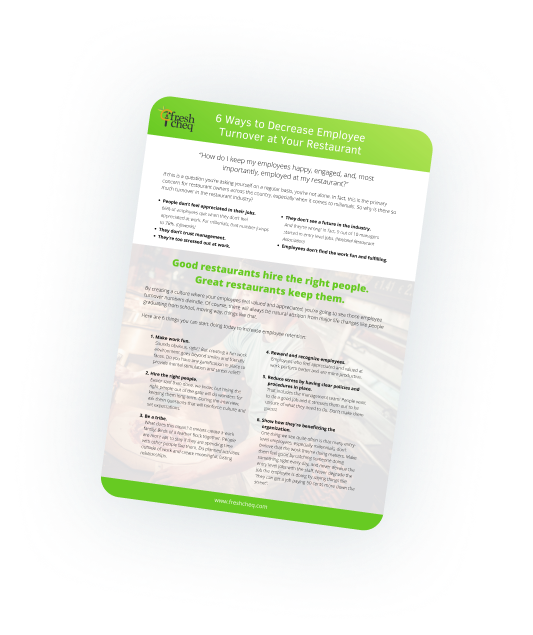Did you know that 53 percent of US restaurants are independent? For independent businesses and chains alike, seamless restaurant management is crucial.
Fortunately, there are several methods that can make running a restaurant far less daunting. Are you a restaurant owner looking for ways to improve efficiency?
The following guide will explain 7 ways to make managing a restaurant easier. Read on to discover how to simplify the restaurant process and grow your business.
1. Value Your Employees
Whether it's chefs or dishwashers, remember that your employees are the backbone of the restaurant. That's why staff retention is so important to restaurant management.
Your staff will work more efficiently when they know that you genuinely appreciate them. Consider what perks and benefits you can provide them to show that you're invested in their well-being and growth.
Encourage your staff to share their thoughts and ideas and find ways to implement them. If your employees feel like they contribute, they're more likely to stay.
2. Invest in Technology
Having the right technology can help make management easier and reduce paperwork in several ways. They allow restaurant owners to easily track inventory, sales, employee performance, food waste, and more.
Small restaurants often struggle to run efficiently without having to hire extra employees or working late hours crunching numbers. Digital food safety technology will allow a single person to monitor almost everything going on with their restaurant from anywhere in the world.
All you need is an internet connection to view your restaurant's happenings in the palm of your hand. It not only saves time but money on unnecessary hires as well.
3. Use Delivery Service Apps
Delivery service apps help reach fresh customers and grow sales. They also let you offer home delivery options to customers, which has grown in popularity substantially.
You can use these apps to easily offer discounts and roll out loyalty programs. You also don't have to worry about taking an order down wrong, because the customer input the information on their own.
It's also important to note that delivery apps work well to boost your restaurant's online presence. Most popular delivery apps include reviews and ratings of restaurants.
4. Delegate Work
Having control over your very own business is great, but don't try doing everything on your own. Remember what you pay your staff and managers to do and trust their skills.
You might even find new, better ways of doing certain tasks letting others contribute more often. It also lets you put your time and energy into higher-priority tasks instead of getting hung up on the little things.
The more work you delegate to your staff, the more skills they'll learn and develop. Delegating work is vital for time management and will improve the overall productivity of your restaurant.
5. Always Plan Ahead
You must always plan ahead and anticipate what's coming up in the following weeks, months, and years of your restaurant. Monitor how much money you have, where you're getting it from, what bills you have due, workforce demand, and any other expenses.
Poor organization of your restaurant can result in much larger problems down the line that will cost you time and money. Set realistic goals for your restaurant and prepare to be flexible.
For example, your goal might be to hit a certain sales number sometime in the first year of running your restaurant. Try setting a monthly sales target and review it frequently to ensure you're on track to meeting your goal.
Remember that there might come a time when you need help from professionals like repair techs and attorneys. Decide who you want to use ahead of time so that you're prepared if a problem arises.
6. Develop a Routine
While managing a restaurant requires flexibility, routines serve an equally important purpose. For example, employees need clear daily tasks and shift times. Planning out a structured routine is especially critical if you want to scale your restaurant.
Having a clear daily routine will also help relieve stress for you and your staff. When everyone knows what they're supposed to be doing and when to do it, the whole team benefits.
Have your managers use appointment slots to avoid interruptions if other employees need to meet and talk. Decide which restaurant tasks are the most important and block out more time for them.
If you can't stick to the routine you create, evaluate what's going wrong and don't hesitate to make changes. You might have forgotten to add tasks or underestimated how long certain things take to do.
7. Prioritze Marketing
First, make sure that your restaurant's website is optimized for mobile devices so that you don't lose out on traffic. Test your site on different devices and make sure that menus and other features are displayed correctly.
Remember that the goal of spending money on marketing your restaurant is to boost revenue to meet your goals. Consider investing in paid ads, flyers, and sponsorships to grow your restaurant's sales.
If you're on a tight budget, there are free ways to advertise your restaurant as well. Examples include email campaigns, social media posts, and partnerships with other businesses.
You can use a template for your restaurant marketing to schedule all your advertising activities. Marketing templates also allow you to check the performance and impact of each method you try.
Simplifying Restaurant Management
Now you know 7 ways to make restaurant management a breeze. Don't shy away from using technology, delegate work, set routines, plan for the future, and invest in marketing.
You can get a demo of FreshCheq to start your journey towards better restaurant management today. It can help you automate daily tasks, execute food safety, build strong habits, and much more. Remember our guide and watch your restaurant grow and thrive!



